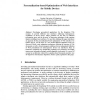Free Online Productivity Tools
i2Speak
i2Symbol
i2OCR
iTex2Img
iWeb2Print
iWeb2Shot
i2Type
iPdf2Split
iPdf2Merge
i2Bopomofo
i2Arabic
i2Style
i2Image
i2PDF
iLatex2Rtf
Sci2ools
144
click to vote
MHCI
2004
Springer
2004
Springer
Personalization-Based Optimization of Web Interfaces for Mobile Devices
Developing personalized applications for the ubiquitous Web assumes to provide different user interfaces addressing heterogeneous capabilities of device classes. Major problems are the lack of sufficient presentation space and the diversity of interaction techniques, both requiring adaptive intelligent user interfaces. To meet this challenge this paper introduces an approach for the personalization-based optimization of Web interfaces for mobile devices. On the basis of a user model different adaptation issues are discussed. Firstly, static adaptation mechanisms affecting the structure of Web documents as well as layout managers enabling a device independent definition of Web presentations for heterogeneous devices are introduced. Then an interactive mechanism for dynamically predicting user preferences for hiding unnecessary information through content adaptation is presented. As a proof of concept an architecture realized by a pipeline-based document generator was developed for stati...
Human Computer Interaction | Intelligent User Interfaces | MHCI 2004 | Static Adaptation Mechanisms | User Interfaces |
Related Content
| Added | 02 Jul 2010 |
| Updated | 02 Jul 2010 |
| Type | Conference |
| Year | 2004 |
| Where | MHCI |
| Authors | Michael Hinz, Zoltán Fiala, Frank Wehner |
Comments (0)

